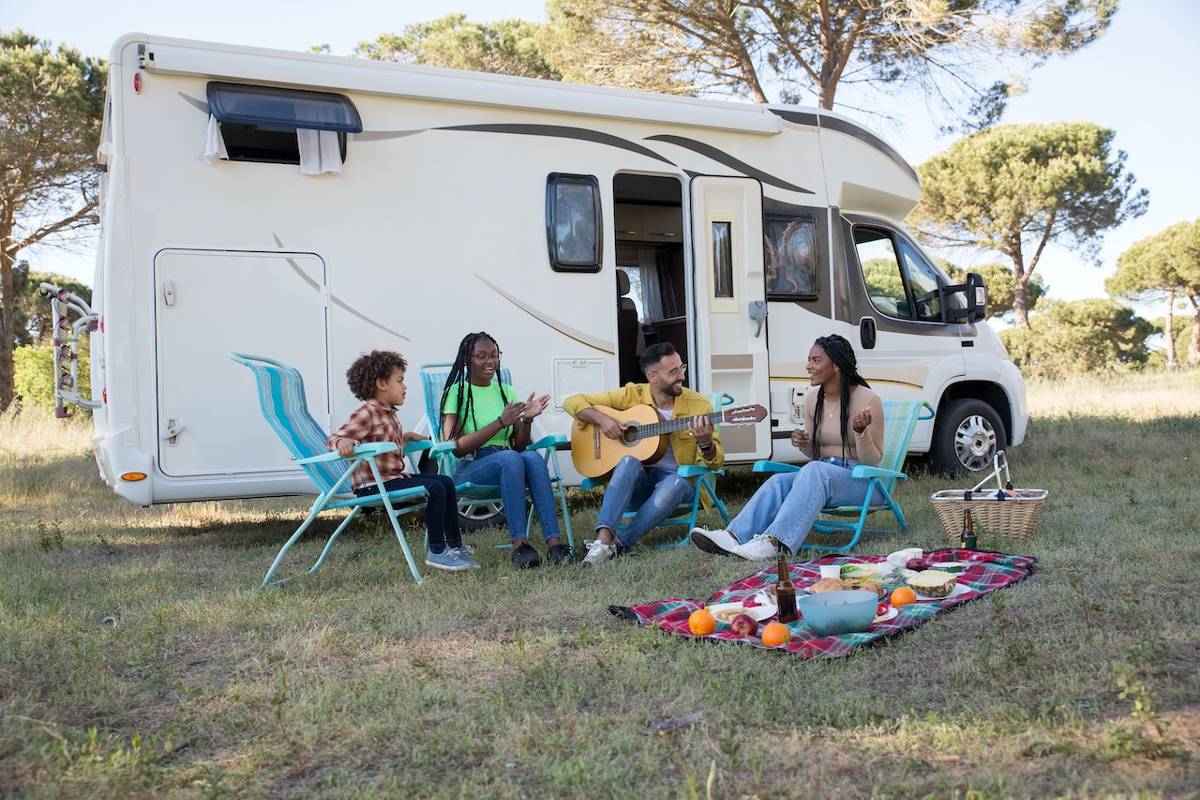Ready to embark on a life of adventure and exploration? Do you think you’re ready to live in an RV full-time? Here’s how you can make living in an RV your new home.
Step one: get ready for the journey ahead; step two: prepare the necessary supplies; step three: figure out the logistics of making it happen.
Living in an RV is not just about having a great time, but also about finding ways to sustain yourself while on the road. From figuring out where you will park and what kind of job opportunities are available, there are many factors that go into creating a successful lifestyle when living full-time in an RV.
Though it may sound daunting at first, with proper planning and research, anyone can learn how to live in an RV full-time! In this article we’ll explore tips and tricks for how to make it work, from packing efficiently and setting up shop wherever you choose, to staying safe throughout your travels. So let’s get started – read on to find out more about living in an RV full-time!
- 1. Benefits Of Living In An RV Full Time
- 2. Preparing For The Transition To RV Living
- 3. Finding An RV That Fits Your Needs
- 4. Stocking Your RV For Full-Time Living
- 5. Managing Your Finances In An RV
- 6. Finding A Place To Park Your RV
- 7. Staying Connected While Living In An RV
- Frequently Asked Questions
- Conclusion
1. Benefits Of Living In An RV Full Time
Living in an RV full-time may seem like a daunting task, but it can be incredibly rewarding. With the right mindset and preparation, you can make living on the road enjoyable and stress free.
Here are some of the benefits that come with embracing this lifestyle:
There is all the freedom that comes with being able to move around whenever you want. You’re no longer tied down to one place or house; instead, you can go explore different areas and take your home anywhere.
This means fewer leases, mortgages, or rent payments – allowing for more financial flexibility. Plus, since RVs tend to be smaller than traditional homes, they also require less energy consumption and maintenance costs associated with them.
Another great perk of living in an RV full time is that you get to experience life at its fullest!
There’s a sense of adventure as you drive through new places and meet people from different backgrounds along the way.
Even if it’s just moving from campground to campground within your own state, each stop will provide something unique – whether it’s a stunning view or interesting locals who have stories to tell about their lives and experiences.
These advantages make RV life not only cost effective but also enriching and fulfilling in ways many other lifestyles don’t offer– making it an attractive option for those looking to escape their day-to-day routines and push themselves out of their comfort zones.
From here you can start preparing yourself for the transition into RV living so that when the time comes, you’ll be ready!
2. Preparing For The Transition To RV Living
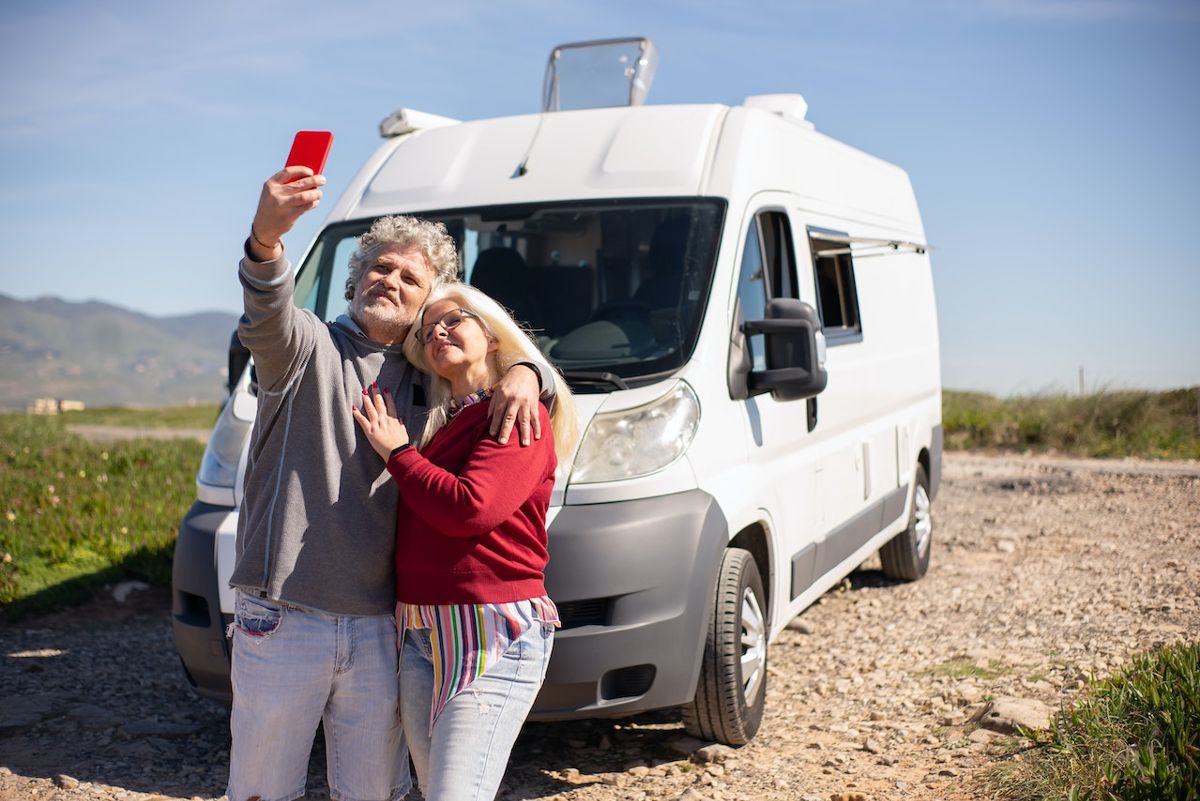

The idea of living in an RV full time is a romantic one, with visions of exploring the open road and taking your home anywhere you want. But before that dream can become reality, there are some important steps to take.
Preparing for the transition to RV living requires more than just packing up one’s belongings – it also entails making sure any lifestyle changes associated with this move are comfortable and sustainable.
It’s essential to have realistic expectations about what life on the road will be like; transitioning from a house or apartment into an RV means not only saying goodbye to certain luxuries but also having the flexibility and resourcefulness necessary for problem-solving when surprises arise.
Researching campgrounds and other places where RVs can park overnight should be done well ahead of time so decisions can be made based on factors such as:
- Availability of RV parking spots: Before you go pulling into a popular RV park, make sure that they have availability and are not up-charging due to having limited spaces.
- Costs: You’ll want to make sure that where you choose to park at has affordable rates to stay per night, per week, or monthly, depending on your length of stay.
- Location: You should consider the distance and accessibility of the campground from your destination, as well as the surrounding attractions and amenities. Some campgrounds may be closer to scenic spots, hiking trails, or historical sites, while others may be more secluded and peaceful. You should also check the road conditions and weather forecast before heading to the campground.
- Facilities: You should check what facilities are available at the campground, such as water, electricity, showers, toilets, laundry, Wifi, fire pits, picnic tables, etc. Some campgrounds may offer full hookups for RVs or cabins for rent, while others may only have primitive sites with no amenities. You should also check if there are any fees or reservations required for using the facilities.
- Rules and regulations: You should familiarize yourself with the rules and regulations of the campground before arriving. Some campgrounds may have restrictions on pets, noise levels, alcohol consumption, firewood collection, etc. You should also respect the wildlife and environment of the campground and follow the leave no trace principles.
- Safety and security: You should ensure that the campground is safe and secure for you and your belongings. Some campgrounds may have security guards or cameras on site, while others may rely on self-policing by campers. You should also be aware of any potential hazards or risks at the campground such as bears, snakes, poisonous plants etc. and take precautions accordingly.
- Reviews and ratings: You should read reviews and ratings from other campers who have stayed at the campground before. They can give you valuable insights into what to expect from the campground in terms of quality, service, atmosphere, as well as any tips or recommendations they may have. You can find reviews and ratings on various websites such as Campendium, The Dyrt, or Hipcamp.
Additionally, creating a budget plan is key because many people underestimate how much they’ll need to spend while traveling in their homes-on-wheels.
Finally, learning basic maintenance skills such as changing tires and oil checks may come in handy down the line – even if professional help is sought out at times it pays off knowing the basics.
With proper preparation and research, anyone considering embarking on this adventure can make informed decision regarding both short-term and long-term goals related to RV life. And with that knowledge comes peace of mind – something invaluable when hitting the open roads!
Ready now? Let’s check out finding an RV that fits your needs…
3. Finding An RV That Fits Your Needs
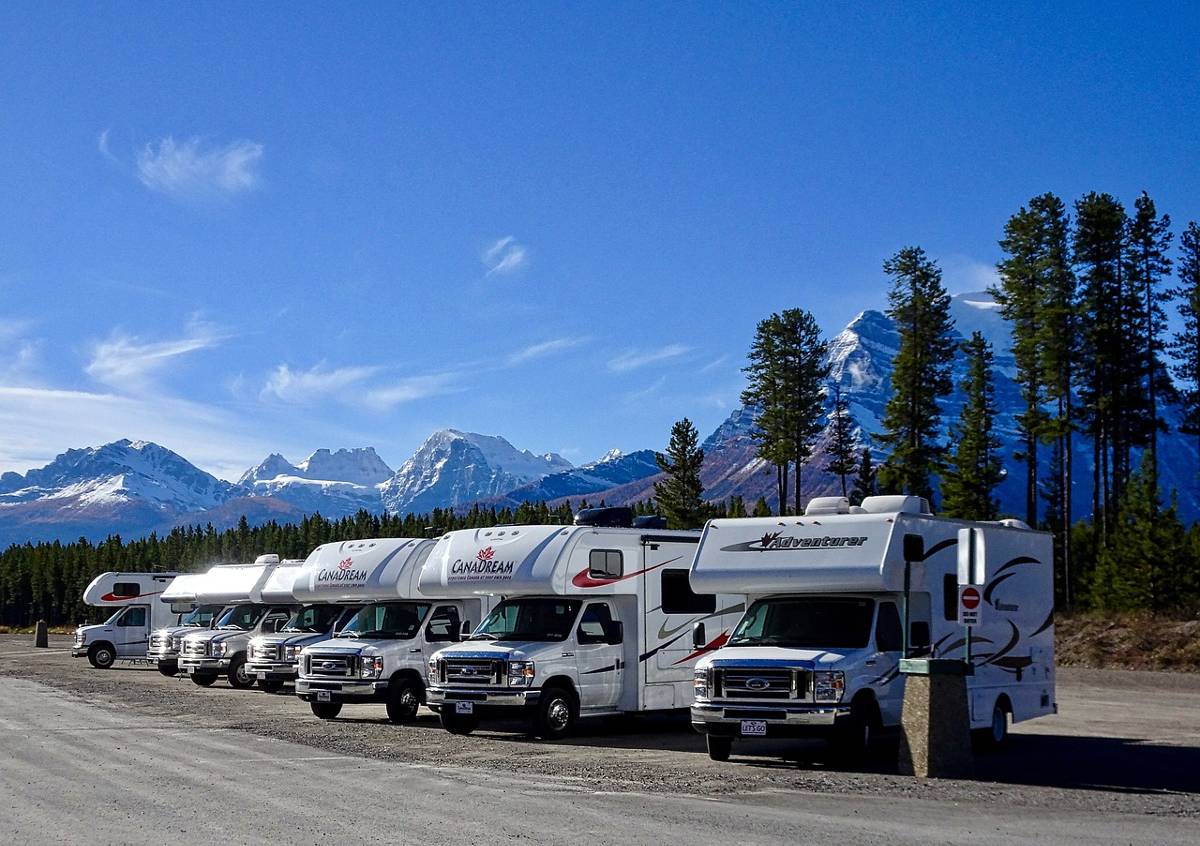

Choosing an RV for full-time living is no small feat. It’s almost like finding a needle in a haystack – the options are endless and overwhelming!
You’ll want to make sure that you find something that fits all of your needs perfectly, from size to amenities to budget and more.
There are a ton of choices out there, and the search may seem daunting, but it doesn’t have to be.
Before you even start looking at RVs, create a list of everything that you need or would like in an RV and then prioritize them by importance.
This will help narrow down your search significantly so you don’t waste time looking at models that won’t suit your lifestyle.
After making this list, research different types of RVs such as travel trailers, fifth wheels, Class A motorhomes, etc., and decide which type best suits your needs.
Here is a list of types of RVs (recreational vehicles) and their features that you can look further into to decide if it meets your needs:
- Class A motorhomes: These are the largest and most luxurious RVs, with amenities like full kitchens, bathrooms, bedrooms, living areas and even slide-outs. They are also the most expensive and require a lot of maintenance and fuel.
- Class B motorhomes: These are also known as camper vans or conversion vans. They are smaller and more agile than Class A motorhomes, but still offer some comforts like beds, sinks, stoves and toilets. They are ideal for solo travelers or couples who want to explore off-the-beaten-path destinations.
- Class C motorhomes: These are somewhere between Class A and Class B motorhomes in size and features. They have a cab-over design that provides extra sleeping space above the driver’s seat. They usually have a kitchen, bathroom, bedroom and dinette area. They are more affordable and easier to drive than Class A motorhomes, but still offer plenty of space and comfort for families or groups.
- Travel trailers: These are towable RVs that come in various shapes and sizes. They can range from small teardrop trailers that can be towed by a car to large fifth-wheel trailers that require a pickup truck. They offer more flexibility and versatility than motorhomes since you can detach them from your vehicle and use it for other purposes. They also have different floor plans and layouts to suit your needs and preferences.
- Pop-up trailers: These are also towable RVs that have collapsible walls that fold down when not in use. They are lightweight and easy to store and transport. They offer a simple and budget-friendly way to enjoy camping with some basic amenities like beds, tables, stoves and sinks. However, they may not be very comfortable or durable in harsh weather conditions or long-term use.
- Truck campers: These are RVs that fit on the bed of a pickup truck. They are compact and convenient for traveling on rough roads or remote areas. They have some features like beds, cabinets, stoves and toilets that make them suitable for living in full time. However, they may not have much living space or storage capacity compared to other RVs.
Once you’ve narrowed down your choices based on the type of RV, take into account other factors such as price range, features (e.g., kitchen appliances) and length/size. Think about what kind of climate you plan on spending most of your time in as well; some campers are better suited for certain environments than others.
Consider whether or not storage space is important to you; if so, look for RVs with plenty of compartments both inside and out.
Double check details such as weight limits when selecting a model before committing to purchase one.
Making sure all these boxes have been checked off can save you lots of hassle further down the road – literally!
Here are some of the most popular RV brands and models for full-time living:
- Newmar Dutch Star: a luxurious Class A motorhome with spacious interiors and high-end features.
- Airstream Classic: a classic American travel trailer with a sleek design and modern amenities.
- Roadtrek CS Adventurous: a compact Class B RV that offers versatility and fuel efficiency.
- Grand Design Reflection: a fifth-wheel trailer that combines comfort and style with durability and affordability.
- Casita Spirit: a lightweight fiberglass travel trailer that is easy to tow and maintain.
- Keystone Montana: a spacious fifth-wheel trailer with four-season insulation and smart technology.
- Northwood Arctic Fox: a rugged travel trailer with off-road capability and solar power.
- Airstream Interstate: a sleek Class B RV with Mercedes-Benz chassis and luxury features.
- Thor Four Winds: a cozy Class C RV with bunk beds and outdoor entertainment.
- Winnebago Revel: a versatile Class B RV with 4×4 drive and off-grid functionality.
4. Stocking Your RV For Full-Time Living
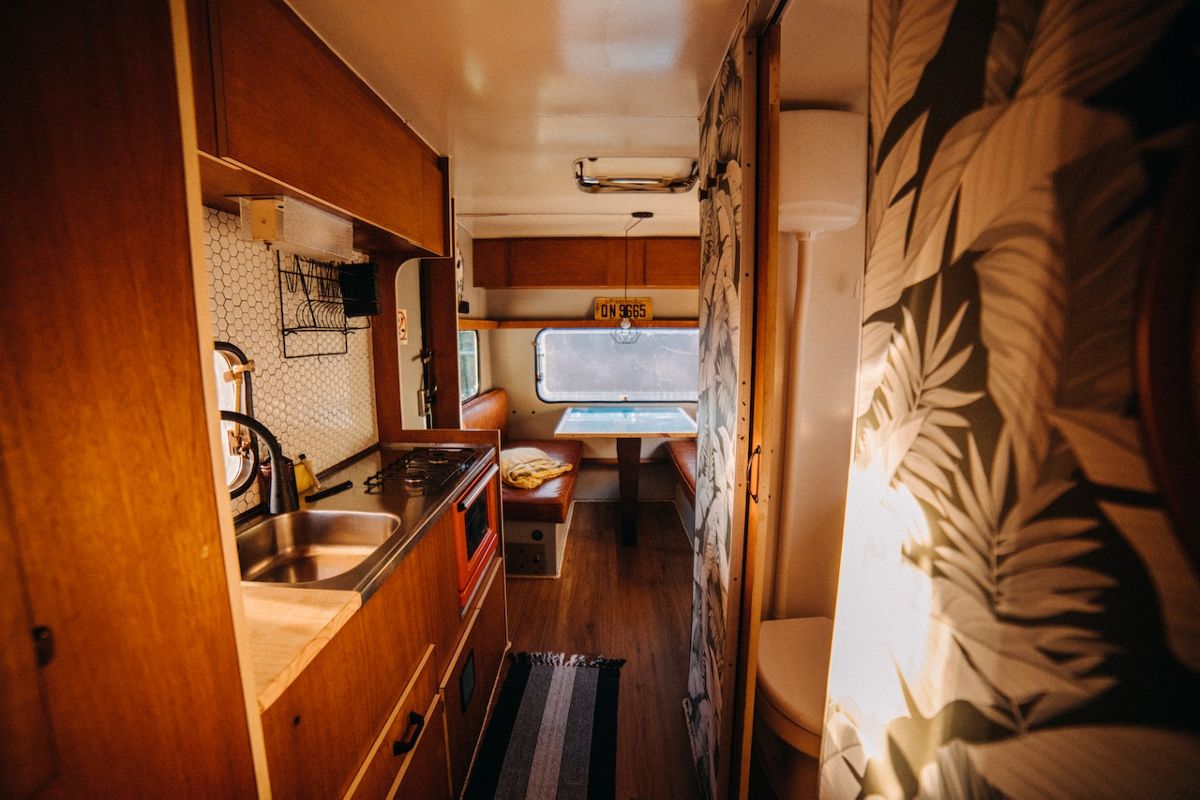

Stocking your RV for full-time living is an important step in making sure the space feels like home.
It’s not just about finding furniture and filling shelves – it’s also about creating a functional, livable environment that suits your lifestyle. Here are four key items to consider when stocking your RV:
- Kitchen Supplies: Stock up on all of the necessary kitchen supplies including pots, pans, plates, cutlery, cooking utensils, dish towels, and cleaning products. Consider getting food storage containers such as Tupperware or glass jars with airtight lids to keep food fresh.
- Entertainment: Investing in some form of entertainment will be beneficial while living in an RV full time. Whether you prefer board games or books, having something fun to do during inclement weather days can make life more enjoyable. Don’t forget outdoor sports equipment too!
- Home Office Space: Having a dedicated workspace for productivity is essential if you plan on working from the RV full time. Get yourself setup with a comfortable chair and desk so you have somewhere to focus and stay organized throughout the day.
- Personal Items: Add touches of home by bringing personal items like photos of family or friends, plants for decoration, favorite blankets/pillows/rugs etc., artwork that makes you feel happy (and inspires creativity!), and any other items that make you feel at ease after a long day out exploring nature’s beauty.
Living in an RV requires organization and planning ahead when it comes to packing up essentials before departure day arrives each season; however once adequately stocked and equipped with everything needed for a successful transition into life on the road – managing finances becomes much easier!
5. Managing Your Finances In An RV
For anyone living full-time in an RV, managing one’s finances is a crucial part of the lifestyle.
There are numerous costs associated with maintaining and operating your vehicle: from fuel to insurance and taxes.
There may be other expenses that come up during your travels. It’s important to develop a budget that accommodates all these items while still allowing you to enjoy yourself along the way.
An effective approach for this could include setting aside money each month for essentials such as food, gas, and repairs.
You should also consider creating separate accounts dedicated solely to fun activities or travel experiences so that you don’t blow your entire budget on them.
By doing this, you can ensure that both essential needs and wanton desires are taken care of without going into debt or overspending.
It might be helpful to keep track of all income and expenditures, either through online banking or manual tracking methods like spreadsheets or paper records.
This will help you stay organized when it comes time to pay bills or allocate funds for new purchases.
For many digital jobs, you can continue to hustle and put in work on a laptop while you’re traveling so that you can continue to support and finance your new RV lifestyle.
From here, you’re ready to move onto finding a place to park your RV—the next step in making sure your adventures go smoothly!
6. Finding A Place To Park Your RV
Living in an RV full time has become increasingly popular over the past decade, with around 10 million people estimated to have chosen it as their primary residence.
This is a great option for those who are looking for freedom and flexibility, but it can also come with certain challenges. One of these is finding a place to park your RV so that you can live comfortably.
The most important thing when searching for an area to settle down in is safety; you want to make sure that your home is secure from any potential threats such as theft or vandalism.
You should also look into local laws regarding vehicle registration and insurance requirements, as well as any zoning regulations before picking a spot. Once this research has been done, there are several places where you could potentially set up camp.
Free & Discounted RV Parking Options
If you’re on a budget and simply looking for some free, cheap, or discounted RV parking, here are a few options:
- Workkamping: This is a method of securing a spot to live in your RV by working at a campground or RV park. You can get free or discounted site fees, utilities, and other perks in exchange for your labor.
- Amazon Camperforce: This is a program that hires RVers to work at Amazon fulfillment centers during peak seasons. You can earn money and get free campsite fees, bonuses, and other benefits.
- National/State Park host: This is a volunteer position that involves helping out with various tasks at a park, such as greeting visitors, collecting fees, maintaining facilities, etc. You can live in your RV at the park for free or for a nominal fee.
- County Parks: Some county parks offer RV camping for free or for a low cost. You can enjoy nature and amenities while living in your RV. Check with the local authorities before you park.
- Bureau of Land Management (BLM) Lands: These are public lands that are open for dispersed camping for up to 14 days. You can park your RV anywhere on these lands as long as you follow the rules and regulations. You can enjoy solitude and scenic views while living off-grid.
- Approved businesses: Some stores like Wal-Mart, Cabelas, Bass Pro Shop, Camping World, etc., will allow you to park your RV for one night while you’re between destinations. You should always call the store in advance to make sure this is okay because overnight parking is not allowed at every location.
- Membership Clubs: There are some clubs that offer access to exclusive RV parking locations for their members. For example, Boondockers Welcome connects you with hosts who let you park on their property for free; Harvest Hosts lets you stay at farms, wineries, museums, etc., for free; Planet Fitness gives you access to their gyms and showers across the country.
One common option is public parks, which often offer amenities like water hookups and electrical outlets for RVs.
Many rural areas also allow ‘boondocking’ – camping on private land without needing permission from the owner – while some cities may provide designated spaces specifically designed for RVs.
Some companies will even let you stay at their parking lots overnight if they don’t require 24/7 surveillance.
With so many options available, there’s no shortage of places to choose from when deciding where to park your RV full time!
Wherever you decide to go, having knowledge about each location beforehand will help ensure that everything goes smoothly along the way. It’ll be worth taking the extra time upfront to prepare yourself and find the best possible spot to call home in an RV!
7. Staying Connected While Living In An RV
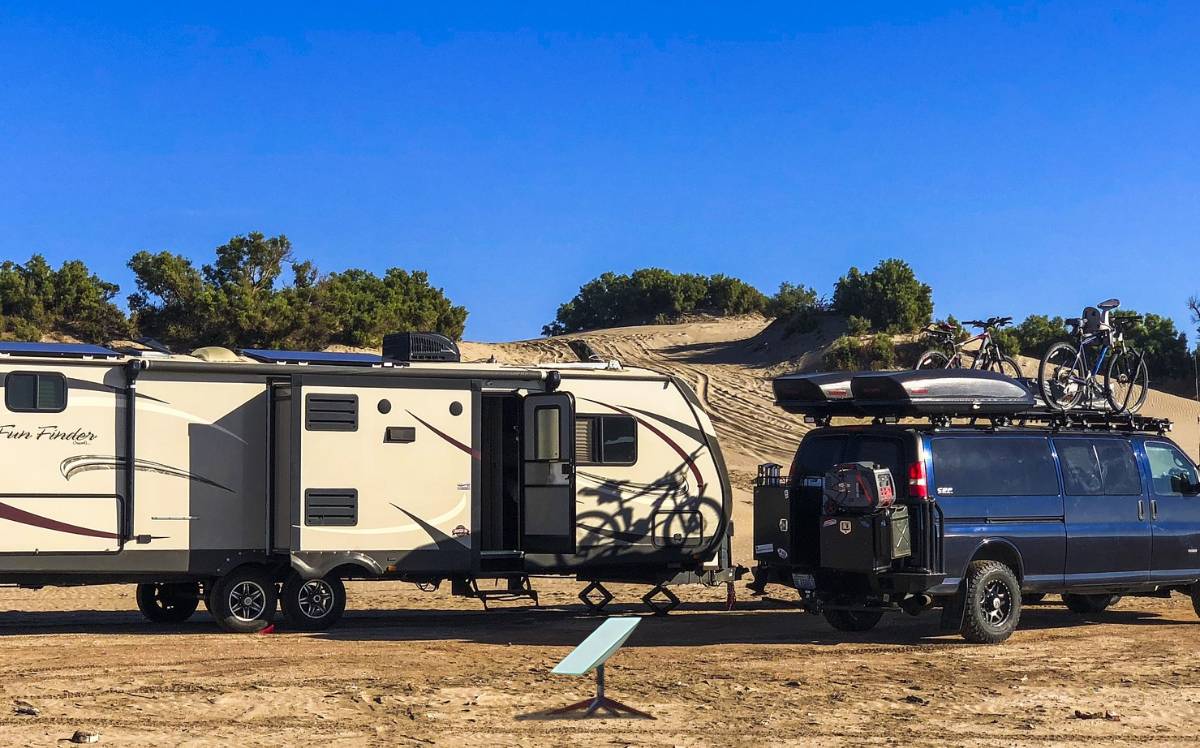

There are some simple ways to remain connected and make sure that you stay up-to-date with all your contacts.
First of all, Wi-Fi and cell phone signals are essential for keeping in contact with friends and family. Wi-Fi hotspots can be found almost anywhere these days, from coffee shops to campgrounds – just make sure to check if they offer free or paid plans before connecting.
If you’re planning to use your cellphone as well, consider investing in a booster antenna so you can access more reliable signal coverage even when traveling off the beaten path.
Don’t forget about satellite internet options such as HughesNet or Viasat which can get you connected but suffer from slow speeds, data caps, and high rates. Depending on your situation, these may not be available in your location.
Nowadays, Starlink Internet is one of the best options for RVs and campers. You can just attach the satellite dish to your roof and enjoy internet access just about anywhere you can get a clear view of the sky!
You can even opt-in for the ‘In-motion’ hardware to be able to use the satellite dish while driving, moving, and traveling. The standard dish will work fine if you’re parked and stationary.
You can also pause and unpause your service to avoid paying your monthly fee when you won’t be using it and just enjoying the outdoors.
There is a higher up-front cost for Starlink Internet since you have to buy the dish itself plus the subscription fee, but it is a million times better than HughesNet or Viasat.
I personally use Starlink and highly recommend it over other options, especially when you need high speed internet with no data caps for your work.
Frequently Asked Questions
What Type Of Insurance Is Required For Full-Time RV Living?
When considering full-time RV living, insurance is an important factor to consider. Depending on the type of vehicle you choose and where you plan to live, there are several types of insurance that may be required for your situation.
The most common forms of insurance include liability coverage, comprehensive/collision coverage, uninsured/underinsured motorist protection, and personal injury protection (PIP).
- Liability coverage provides financial protection if it’s determined that you were at fault in a car accident resulting in damages or injuries.
- Comprehensive/Collision coverage helps protect against damage to your vehicle from theft or accidents.
- Uninsured/Underinsured Motorist Protection covers expenses incurred if an accident was caused by another driver who doesn’t have adequate insurance coverage.
- PIP pays medical bills and related costs associated with any injuries sustained while traveling in your RV.
It’s also a good idea to research state laws regarding minimum requirements for RV owners when it comes to insurance policies.
Each state has different regulations concerning what kind of vehicles require which type of policy so make sure you know what’s needed before setting out on your journey!
TIP: As the saying goes – ‘better safe than sorry!’ When researching RV insurance options, look into getting travel assistance as part of a package deal – this can provide additional peace of mind during those long drives ahead!
What Are The Legal Considerations For Living In An RV Full-Time?
Living in an RV full-time is a great way for people to enjoy the freedom of travel, explore different destinations and even take up residence. There are however legal considerations that must be taken into account before taking this lifestyle choice on. From insurance needs to zoning regulations, here’s what you need to know.
First, it’s important to understand that where you park your vehicle can significantly impact how long you’re allowed to stay there or if you even have permission from the landowners.
For example, some areas may require permits or allow only short term stays while others may offer longer terms depending on local rules and regulations. It’s always best to research these laws before setting out so as not to get hit with fines or penalties later down the road.
Second, some states may also require specific types of insurance coverage such as collision protection and medical payments coverage when living in an RV full time. Make sure you check with your insurer prior to hitting the open road since failing to adhere to state requirements could lead to hefty fines or other consequences.
TIP: If possible, look into joining an RV club which can help provide informational resources about the legalities around being a full-time RVer! They often have members who are familiar with various city ordinances and give advice on everything from parking spots in certain cities, best places for overnight camping and more.
How Can I Find A Job While Living In An RV Full-Time?
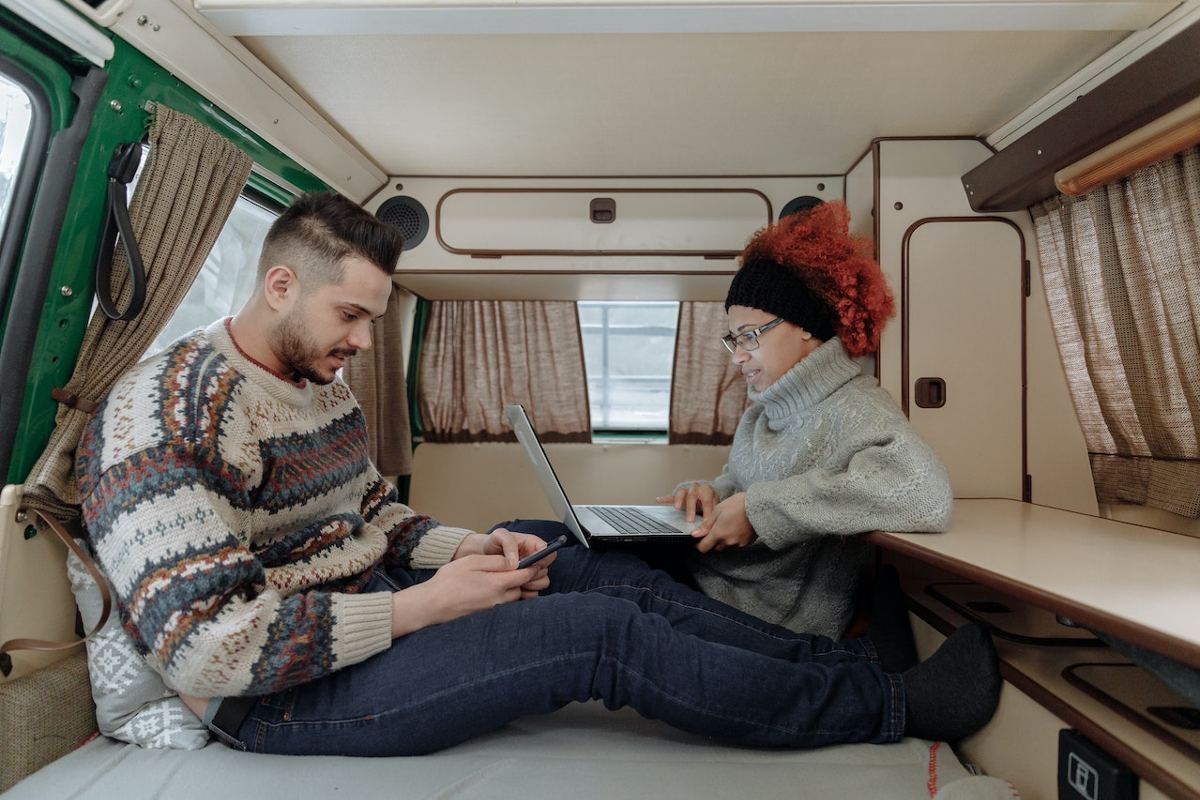

Living in an RV full-time is a great way to travel and explore the country, but it can be challenging to find work while on the road. It’s important to understand the legal considerations for living in an RV full-time as well as how to go about finding employment.
The first step when trying to find a job while living in an RV full-time is researching where you are allowed to stay long term.
Many parks have restrictions on length of stay, so if you plan on staying more than just a few days or weeks, make sure that your new home base allows extended stays like this.
Many states have laws restricting how much time you can spend at any one location before having to move again; these rules vary state by state and should be taken into consideration when planning out your journey.
When looking for jobs while living in an RV, there are several resources available online such as Craigslist and Indeed which list local job openings near where you’re currently located.
You’ll also want to look into freelancing opportunities such as web design, copywriting or tutoring gigs which allow you the flexibility of working from anywhere with an internet connection.
Many industries now even provide options for remote work based out of your RV. With some creativity and research it’s possible to find meaningful work that fits with your lifestyle no matter where you decide to call home!
No matter what type of job search strategy you choose, remember that being flexible and open minded will help increase your chances of success when looking for employment while living in an RV full-time.
Networking with other travelers or locals who might know about potential job opportunities can also be beneficial and don’t forget about utilizing social media platforms like LinkedIn or Twitter – connecting with employers directly could lead to unexpected doors opening up!
What Type Of Health Care Options Are Available While Living In An Rv Full-Time?
Finding suitable healthcare coverage when you’re constantly on the move is challenging, but not impossible.
One option for those looking for health care while traveling in their RV full-time is Medicaid or Medicare. Depending on your location, these programs may provide medical services with just a few qualifications such as income level and age requirements.
In some cases, there are even specialized plans that allow for travel between states without losing coverage; however, each state has different regulations so research must be done ahead of time.
Another choice would be private insurance companies who offer short term policies specifically designed for travelers and RVers. These typically cover emergency situations only and often come at a higher cost than other types of insurance plans, but they do provide an extra layer of protection should something happen during your travels.
There are also many online resources available which make comparing plans easier than ever before – allowing you to find the best policy that fits within your budget and lifestyle.
No matter what type of plan you choose, having access to quality healthcare while living in an RV full-time can give you peace of mind knowing that if something were to happen, you wouldn’t have to worry about how to pay for medical treatments or procedures out of pocket.
When living out in nature 24/7, that freedom does come with a higher risk of injury or illness if you are not careful.
Taking the time now to research all available options will ensure that any bumps along the journey are dealt with quickly and effectively – giving you more flexibility and freedom when it comes to exploring new places from behind the wheel!
What Social Activities Are Available While Living In An Rv Full-Time?
It’s important for those considering a life on the road to know about all their options when it comes to staying socially active whilst living in an RV full-time.
For starters, there are plenty of campgrounds that offer group activities such as movie nights, potlucks, or game nights.
These events provide a great opportunity to meet other like-minded travelers and make new friends while enjoying fun activities. Other camping sites may have amenities such as pools, playgrounds, or organized sports leagues which can help expand your network even further.
It is also possible to join local RV clubs or organizations where you will find fellow RVers who share similar interests or lifestyles.
This type of community often offers trips and outings together providing more opportunities for getting out and having fun while meeting new people at the same time!
Additionally, many cities and towns host monthly gatherings specifically tailored towards RVer’s looking for more permanent connections through shared experiences.
No matter what kind of activity you prefer, from joining an online video chat group or attending a yoga class in town; by exploring all the available options and taking advantage of them when appropriate you should never feel lonely or bored living in an RV full-time!
Conclusion
Living in an RV full-time may sound intimidating, but it can be a rewarding experience. To make the most of your journey, you’ll need to keep some important considerations in mind.
Be sure to research and obtain the necessary insurance and legal documents before taking off on your adventure.
Additionally, find ways to bring income into your life while keeping up with medical costs that come with living on the road. Last but not least, don’t forget about finding ways to stay connected socially! Everyone needs a support system for times when things go south–it’s like having a safety net at all times.
Ultimately, no matter where life takes you, there are always opportunities out there if you’re willing to look for them. With hard work and dedication, you can live an idyllic life traveling around in an RV full time!
